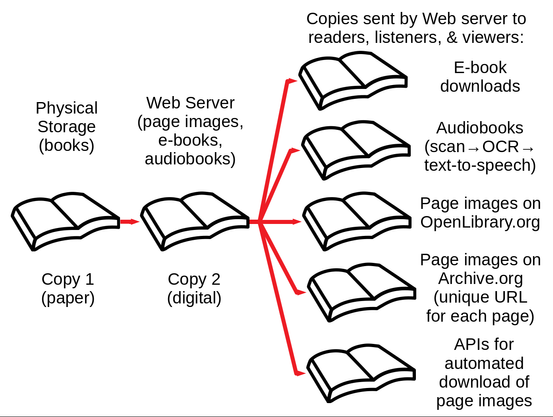the fact that the Internet Archive got into bigger trouble for lending books they paid for than Facebook did for reproducing books they pirated tells you everything you need to know about copyright.

What is the Internet Archive doing with our books? | NWU
The NWU presented a public informational webinar on “What is the Internet Archive doing with our books?” on April 27 and May 5, 2020. The webinar explains "Controlled Digital Lending", the "National Emergency Library", and "One Web Page for Every Page of Every Book": Video of webinar Slides from webinar Related articles: We Need Federal
Aren't you (and NWU there) describing the IA National Emergency Library (which can certainly be debated) rather than how IA has operated outside a ~3-month period in 2020?
Are you suggesting that IA is currently doing this?
https://nwu.org/what-is-the-internet-archive-doing-with-our-books/

What is the Internet Archive doing with our books? | NWU
The NWU presented a public informational webinar on “What is the Internet Archive doing with our books?” on April 27 and May 5, 2020. The webinar explains "Controlled Digital Lending", the "National Emergency Library", and "One Web Page for Every Page of Every Book": Video of webinar Slides from webinar Related articles: We Need Federal
Thank you - although that's the same link, and the unlimited-numbers-of-copies part in your first message relates only to a short period during the pandemic.
The part to which I can understand authors objecting (and even then IA is not the real cultural enemy) is the business about IA sharing scans for in-copyright books without paying the higher fee that libraries do for sharing copies.
Do you have any figures for what fraction of in-copyright books appear in IA? Pretty much everything I access is either out of copyright or else provided by the publishers/authors for public-good reasons. And the ones that I've seen loaned seem only to have minimal sample pages otherwise accessible (far fewer pages than e.g. a typical Amazon sample view). For example, is IA sharing copies of the books you've authored? Can you provide some concrete examples of books which illustrate the harm? Thanks.

What is the Internet Archive doing with our books? | NWU
The NWU presented a public informational webinar on “What is the Internet Archive doing with our books?” on April 27 and May 5, 2020. The webinar explains "Controlled Digital Lending", the "National Emergency Library", and "One Web Page for Every Page of Every Book": Video of webinar Slides from webinar Related articles: We Need Federal
Thanks again. The URL-per-page is a technical aspect (one that I rely on daily for managing references to materials in the #BiodiversityHeritageLibrary - part of IA, but separate from the OpenLibrary). The issues at question are the channels by which books become scanned copies, the proportions of such texts that can be accessed by users, and whether IA is operating properly as a library in what its doing for the still-encumbered works.
I do understand your concern and won't try to argue you into seeing IA as a positive, although I am confident it is one of the most important efforts we have for ensuring the preservation of human knowledge and culture in increasingly dark times. I do believe that the NWU page weakens its case by repeatedly insinuating bad faith (e.g. in the comments following the take-down of the freelance writers' guide).
We Need Federal Funding for Distance Learning, During the Pandemic — and After | NWU
The COVID-19 pandemic has created a huge increase in demand for digital copying and distribution of written (and visual) materials for distance learning at all levels. This includes everything from current news articles to textbook content to literature and non-fiction books. Writers are, of course, eager to make our works more widely available -- and